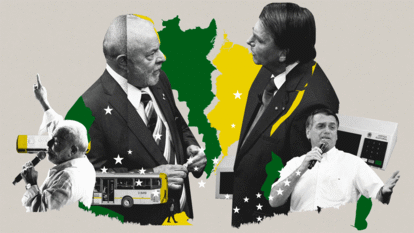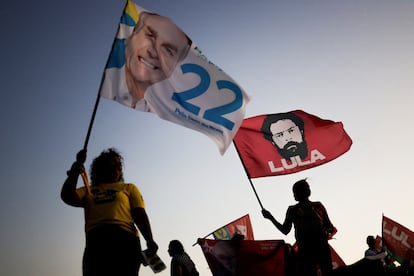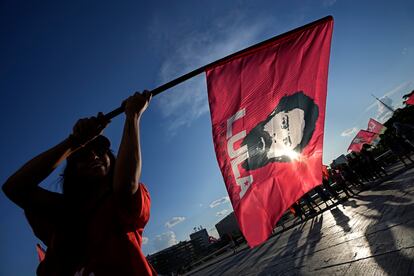Lula vs Bolsonaro: Brazil heads to the polls in heated presidential runoff
The country is bracing for a nail-biting finish to what has been a bitter campaign between two of the country’s most prominent figures


Brazilian voters are heading to the polls in a tense election to choose between re-electing far-right President Jair Bolsonaro, 67, or returning leftist former president Luiz Inácio Lula da Silva, 77, to office. The Sunday runoff vote is the final chapter in what has been a bitter campaign between two of Brazil’s most prominent figures. At stake are two very different visions for the world’s fourth most populous democracy.
The battle is extremely close. The count is expected to begin from 5pm in Brasília, when polling stations close. The leftist Luiz Inácio Lula da Silva – or Lula as he is popularly known – has focused his campaign on restoring democracy and returning Brazil to the times of plenty, when under his presidency (2003 and 2010), millions of Brazilians prospered and the poorest were given previously unimaginable opportunities. His nemesis, Jair Messias Bolsonaro, has centered his campaign on defending ultra-conservative values, such as the country’s strict anti-abortion rules, prioritizing individual freedoms and taking a stand against the advance of what he calls “communism.”
Brazilian voters are also voting for the governors of 12 states, including São Paulo, in which there was no conclusive winner at the October 2 vote. Although Lula won 48.5% of the vote in the first round, five points more than Bolsonaro, in the presidential race, most of the seats in Brazil’s National Congress were won by right-wing parties. Lula, the leader and founder of the Workers’ Party (PT), is coming into the runoff with a slight lead in the polls, but it is far from clear whether he will win the election.

Polls anticipate a tight finish, with Lula projected to win 49% of the vote, and Bolsonaro, 44%, according to a Datafolha poll published on Thursday. However, in the first round on October 2, the main pollsters underestimated support for Bolsonaro, who in his entire political career has never lost an election. On the other hand, never in Brazil’s history has the second-most voted candidate in the first round gone on to win the runoff.
Around 92% of the electorate has decided who to vote for; they know whether they will type 13 to vote for Lula or 22 to vote for Bolsonaro in the electronic voting system. Both candidates are well known to the Brazilian people, and both inspire strong feelings. Each one has millions of extremely loyal followers and has been in politics for more than four decades. At this point, there are very few undecided voters.
The final stage of the election campaign has been marked by disinformation and fake news. Lula has been accused of satanism, while Bolsonaro has been described as a cannibal. The level of disinformation is so great that the Superior Electoral Court, the highest body of the Brazilian Electoral Justice, launched an offensive to try to eradicate the unprecedented volume of fake news.
Brazilians are bracing themselves for a nail-biting contest. A Lula victory in Latin America’s richest and most populous country would consolidate the progressive shift in the region. Lula grew up in poverty, learned to read late in life and lost his left finger while working at an automobile parts factory. He rose up the ranks to become a union leader, using the position to organize strikes against Brazil’s military dictatorship. In 2003, he made history when he became the first president of Brazil without a university degree – a feat that still inspires the country’s most marginalized communities.

The emphasis of Lula’s presidential campaign has been on reminding the public of the advances made during his two mandates, but there has been little in the way of concrete policy proposals. To improve his chances of defeating Bolsonaro, Lula has forged a broad coalition that includes even the center-right. He even chose Geraldo Alckmin, a center-right politician and is former adversary, as his running might. Winning the presidential election would mark a new beginning for Lula, who spent 20 months in jail for convictions that were later overturned.
Bolsonaro, however, still maintains strong support despite the trials of the past four years. He has also been given a boost from the country’s recent economic upturn. Other voters who supported him in 2018 have turned against him due to his failure to secure Covid-19 vaccines and poor handling of the pandemic, which has killed nearly 700,000 Brazilians.
A large part of Bolsonaro’s success is due to the fact that he is supported by the country’s powerful agricultural sector. Indeed, he receives most of his campaign funding from business leaders in that industry. The far-right leader is also supported by the main leaders of Brazil’s fast-growing Pentecostal Evangelical Churches. Protestants are one of the most consistent voting groups. Little by little, Bolsonaro has widened his pool of supporters, who historically were soldiers and police officers.

Just as Bolsonaro has had difficulties winning over female voters, Lula has struggled to make in-roads among the country’s Evangelicals. This is largely because Bolsonaro has consistently accused Lula of wanting to legalize abortion and drugs, even though the leftist leader has made no such promises.
The big question hanging over the election is whether Bolsonaro will accept the results. The far-right leader has raised doubts about the credibility of Brazil’s electronic voting system, even though it has been working without incident for 25 years. These doubts have seeped into his most loyal supporters, who have also expressed distrust in the voting system and the country’s electoral authorities. There is great concern that Bolsonaro will dispute the results if he does not win the election. If Lula does win, it will be important for far-right politicians in Colombia and Chile to quickly congratulate him.
If Bolsonaro contradicts the polls and wins Sunday’s runoff, he will give new impetus to the far-right movement, which has been buoyed by Giorgia Meloni’s recent win in Italy and is set to make an impact on the US midterm election on November 8. The presidential battle in Brazil is also key to the future of the Amazon rainforest, which, in turn, will impact the climate crisis.

Tu suscripción se está usando en otro dispositivo
¿Quieres añadir otro usuario a tu suscripción?
Si continúas leyendo en este dispositivo, no se podrá leer en el otro.
FlechaTu suscripción se está usando en otro dispositivo y solo puedes acceder a EL PAÍS desde un dispositivo a la vez.
Si quieres compartir tu cuenta, cambia tu suscripción a la modalidad Premium, así podrás añadir otro usuario. Cada uno accederá con su propia cuenta de email, lo que os permitirá personalizar vuestra experiencia en EL PAÍS.
¿Tienes una suscripción de empresa? Accede aquí para contratar más cuentas.
En el caso de no saber quién está usando tu cuenta, te recomendamos cambiar tu contraseña aquí.
Si decides continuar compartiendo tu cuenta, este mensaje se mostrará en tu dispositivo y en el de la otra persona que está usando tu cuenta de forma indefinida, afectando a tu experiencia de lectura. Puedes consultar aquí los términos y condiciones de la suscripción digital.








































